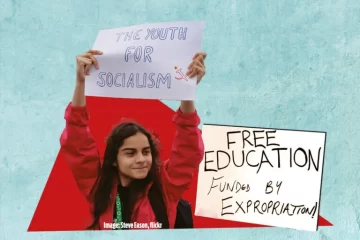The quality and quantity of education available to the public has always been a general measure of social progress. The greater the wealth of knowledge available to its citizens, the more civilised is their society and the higher its level of culture and the quality of existence it provides. Capitalism has always prided itself on making the intellectual riches of all humanity socially available through the development of the means of production and distribution of intellectual materials, primarily through the printing press, globalisation and more recently the internet, along with a public schooling system that has no parallel in human history.
Leaving aside the fact that this picture of things has never in fact been true for a great swathe of humanity, who live in entirely impoverished conditions, we can see that there is a great deal of truth in this. For workers in the advanced capitalist countries – Europe, America, and a few other areas of the world – the rise of capitalism offered a great leap forward compared to the past. Whilst capitalism was still expanding, the labour movement in these countries was able to win crumbs off of the capitalists’ table, which was overflowing with profits from colonial exploitation.
This is no longer the case today. Capitalism has reached its limits and has now entered into a phase of terminal decline. Lurching from crisis to crisis, it cannot afford the reforms of the past. All the fat must be trimmed.
As a result of these cuts, quality public education is under threat. Over the last five years, the average sixth-form has lost 20% of its funding, with some losing up to 30%. Labour has warned that Osborne’s plans for the next few rounds of cuts could close 40% of sixth-forms whilst seriously reducing the quality of education of others. Sixth-forms and colleges have already begun to close A-level courses. Teachers and resources are already pushed to the limit.
Universities have also shouldered significant cuts in the last few years. The funding shortfall is being passed on to students and staff with the introduction of tuition fees, the casualization of many junior academic posts, and increases in rents to balance the books as has taken place in UCL. These policies, now compounded by the scrapping of maintenance grants, combine not only to reduce the quality of higher education in the UK but to make courses far less accessible to students from poorer backgrounds. Alongside this, adult education outside of universities has suffered 28% cuts to funding, drastically reducing the quantity and quality available to those who want to broaden their horizons and develop their skills.
The programme of austerity goes hand in hand with a programme of privatisation. The capitalist class are desperate to make an easy profit. Falling demand due to overproduction means that they cannot invest in the productive sectors of the economy. The greatest part of their money – some £800bn in Britain alone – is simply hoarded, but with the help of their friends in government big business is penetrating public services, healthcare and education. This is what is behind the upsurge in outsourcing and privatisation on university campuses. The privatisation of universities will mean an even further increase in costs such as textbooks and other learning materials, rents, and cafeteria prices, as the bosses scramble to squeeze as much out of students as they can.
As the US Section of the International Marxist Tendency explained in this article from 2014, textbooks – the production of which is controlled by a cartel of just five companies – have already seen their prices rise by a staggering 812% over the last three decades. Students are a captive audience for such extortion, as learning materials such as these are mandated by course programmes and without them students will be at a serious disadvantage.
It is not only the formal education system that has suffered from austerity. Since 2010, 463 library ‘service points’ (which includes mobile libraries as well as static) have been shut down. Another 500 are under immediate threat of closure. Once these have been cut, we will have lost a quarter of our library services. Those that remain are forced to reduce their book buying budgets, meaning that many have to rely on donations. The days in which the latest literature was available to the public for free are rapidly disappearing.
The greatest indignity of these attacks on education – on the very substance of society itself – is that they are wholly unnecessary. It is true that there is no money in the public purse, but the bank accounts of the bankers and the bosses are overflowing. On top of this, the capital portfolios of the super-rich are full of industrial potential that cannot be run at a profit, not because it is not needed, but because the exploitation of the working class means that they cannot afford the goods and services it would produce.
The vast technology of today could be used to bring educational materials to the masses on an unprecedented scale. The internet means that the wealth of world literature – and textbooks – could be available to each and every person for the cost of a kindle e-reader – but copyright gets in the way. This could be removed, with the writers maintained as part of a nationally planned socialised economy under democratic workers’ control. Furthermore, such an economy could use the wealth that is currently squirreled away by the capitalists for a fully funded programme of classroom education that would last from cradle to grave, relegating the problems of today to the dustbin of history.
As the reforms of the past are hacked way, capitalism is losing the few redeeming features that it had. It no longer plays a progressive role in any sense. One recalls the words of Rosa Luxemburg that humanity must choose between ‘Socialism or Barbarism’. There is no third way: the fight for free public education is the fight for socialism!
by Mordecai Levi, Cambridge Marxist Society



